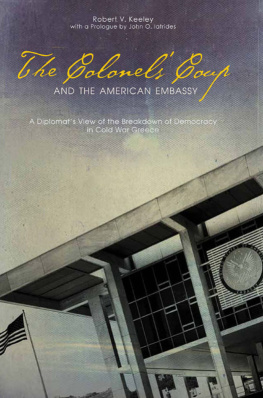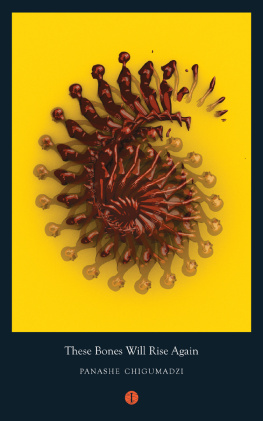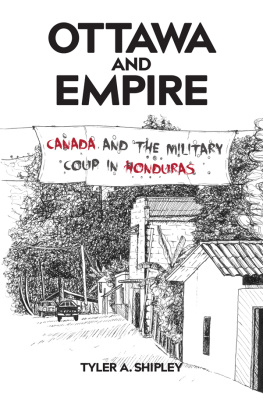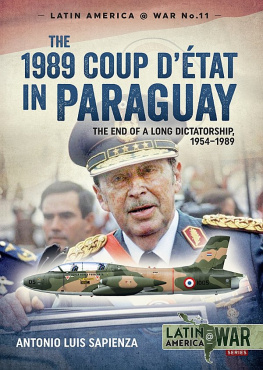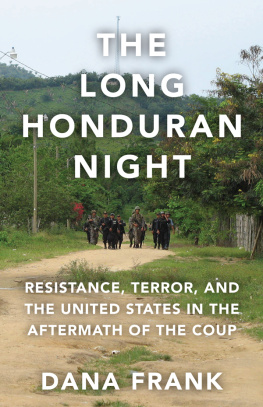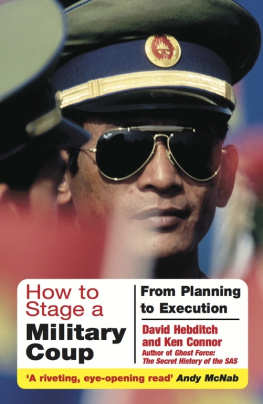The Colonels Coup and the American Embassy
ADST-DACOR
Diplomats and Diplomacy Series
Series Editor: Margery Boichel Thompson
Since 1776, extraordinary men and women have represented the United States abroad under all sorts of circumstances. What they did and how and why they did it remain little known to their compatriots. In 1995 the Association for Diplomatic Studies and Training (ADST) and DACOR, an organization of foreign affairs professionals, created the Diplomats and Diplomacy book series to increase public knowledge and appreciation of the role of American diplomats in world history. The series seeks to demystify diplomacy through the stories of those who have conducted U.S. foreign relations, as they lived, influenced, and reported them. Robert Keeleys account of Embassy Athens and the events surrounding the 1967 Colonels coup fulfills these aims in depth.
OTHER TITLES IN THE SERIES
Gordon S. Brown, Toussaints Clause: The Founding Fathers and the Haitian Revolution
Herman J. Cohen, Intervening in Africa: Superpower Peacemaking in a Troubled Continent
Charles T. Cross, Born a Foreigner: A Memoir of the American Presence in Asia
Brandon Grove, Behind Embassy Walls: The Life and Times of an American Diplomat
Paul Hacker, Slovakia on the Road to Independence: An American Diplomats Eyewitness Account
Parker T. Hart, Saudi Arabia and the United States: Birth of a Security Partnership
Cameron R. Hume, Mission to Algiers: Diplomacy by Engagement
Dennis Kux, The United States and Pakistan, 19472000: Disenchanted Allies
Bo Lidegaard, Defiant Diplomacy: Henrik Kauffmann, Denmark, and the United States in World War II and the Cold War, 19391958
Jane C. Loeffler, The Architecture of Diplomacy: Building Americas Embassies
William B. Milam, Bangladesh and Pakistan: Flirting with Failure in South Asia
Robert Hopkins Miller, Vietnam and Beyond: A Diplomats Cold War Education
Richard B. Parker, Uncle Sam in Barbary: A Diplomatic History
Ralph Pezzullo, Plunging into Haiti: Clinton, Aristide, and the Defeat of Diplomacy
Yale Richmond, Practicing Public Diplomacy: A Cold War Odyssey
Howard B. Schaffer, Ellsworth Bunker: Global Troubleshooter, Vietnam Hawk
James Stephenson, Losing the Golden Hour: An Insiders View of Iraqs Reconstruction
Ulrich Straus, The Anguish of Surrender: Japanese POWs of World War II
An ADST-DACOR Diplomats and Diplomacy Book
The opinions and characterizations in this book are those of the author and do not necessarily represent official positions of the United States Government, the Association for Diplomatic Studies and Training, or DACOR.
Library of Congress
Cataloging-in-Publication Data
Keeley, Robert V.
The colonels coup and the American embassy : a diplomats view of the breakdown of democracy in cold war Greece / Robert V. Keeley.
p. cm.
(ADST-DACOR diplomats and diplomacy series)
Includes bibliographical references and index.
Summary: A first-hand account, by a U.S. diplomat, of the 1967 military coup in Greece, and of how U.S. policy was formulated, debated, and implemented during this period. Explores Greek-U.S. relations within the larger historical framework of the Cold WarProvided by publisher.
ISBN 978-0-271-03758-5 (cloth : alk. paper)
1. United StatesForeign relationsGreece.
2. GreeceForeign relationsUnited States.
3. GreeceHistoryCoup d tat, 1967 (April 21).
4. GreecePolitics and government19671974.
5. DemocracyGreeceHistory20th century.
6. Diplomatic and consular service, AmericanGreeceHistory20th century.
7. Cold WarDiplomatic history.
8. Keeley, Robert V.
I. Title. E183.8.G8K44 2010
327.730495dc22 2010029013
Text copyright 2010
Robert V. Keeley
Prologue copyright 2010
Penn State University Press
All rights reserved
Printed in the United States of America
Published by
The Pennsylvania State University Press,
University Park, PA 168021003
It is the policy of The Pennsylvania State University Press to use acid-free paper. Publications on uncoated stock satisfy the minimum requirements of American National Standard for Information SciencesPermanence of Paper for Printed Library Material, ANSI Z39.481992.
This book is printed on Natures Natural, which contains 50% post-consumer waste.
To all those
who maintained their faith
in democratic ideals,
and particularly to
the political prisoners, exiles,
and other victims
of the regime of April 21,
this book is dedicated.
Of the virtues for which
their classical ancestors
were renowned, they displayed
especially these:
bravery, sacrifice, pride, endurance.
... and to the memory of
GEORGE SEFERIS, 19001971,
Greek, poet, diplomat, linguist,
critic, democrat, gentleman,
teacher, interlocutor, friend.
Wherever I travel Greece wounds me.
George Seferis, In the Manner of G. S. (1936)
It is almost two years since a regime was imposed upon us utterly contrary to the ideals for which our worldand so magnificently our peoplefought in the last World War. It is a state of enforced torpor in which all the intellectual values that we have succeeded, with toil and effort, in keeping alive are being submerged in a swamp, in stagnant waters. I can well imagine that for some people these losses do not matter. Unfortunately this is not the only danger that threatens.
We have all learnt, we all know, that in dictatorial regimes the beginning may seem easy, yet tragedy waits at the end, inescapably. It is this tragic ending that consciously or unconsciously torments us, as in the ancient choruses of Aeschylus.
The longer the abnormal situation lasts, the greater the evil.
George Seferis, public statement of March 28, 1969
CONTENTS
This book was originally written in 1971 and 1972 in Princeton, New Jersey, and Kampala, Uganda. Its genesis might be of some interest to the prospective reader.
For thirty-four years, from 1956 through 1989, I was an officer in the Foreign Service of the United States, the career diplomatic corps. After initial postings in Washington in the executive secretariat of the International Cooperation Administration, the foreign aid agency, and overseas as a junior political officer at our embassies in Jordan and Mali, I was transferred back to the State Department to serve as the junior desk officer for the Congo (called Zaire from 1971 to 1997) in the Bureau of African Affairs. In 1965, after two frenetic years on that desk, I won a competitive fellowship from the National Institute of Public Affairs that enabled me to enjoy an academic year as a non-degree-seeking graduate student at one of eight universities around the country. I chose Stanford, where I studied mostly economics, an important subject for diplomacy that I had neglected as an undergraduate and graduate student at Princeton.
Every year on April 1 in those days, Foreign Service officers (FSOs) around the world would fill out and submit a brief form listing onward postings that interested them should vacancies become available. This became known as the April fools card, as it rarely produced an assignment to a post of ones preference. (Many years later, a new system replaced this form, with people bidding against the competition for posts that were actually becoming available.) For some seven years I had listed three postsAthens, Thessaloniki, and Nicosiawhere Greek was the local language.

